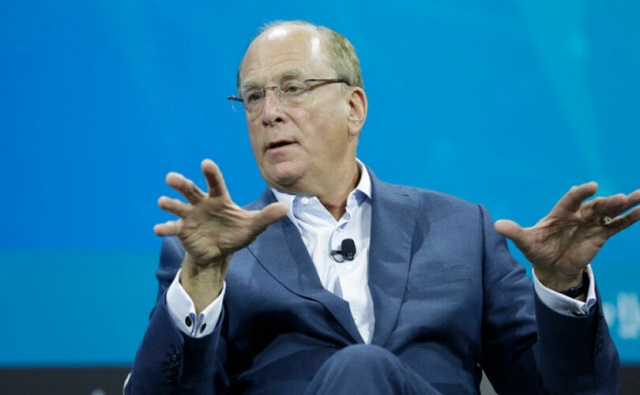Business
BlackRock’s woke capitalist vision is failing: here’s why

Larry Fink, New York Times DealBook 2022. Thos Robinson/Getty Images for The New York Times
From LifeSiteNews
By Frank Wright
Corbett shows how public outrage at the unelected political power of asset managers has led to an investor backlash, with politicians and legislators taking steps against the “forcing of behaviors” which BlackRock CEO Larry Fink once trumpeted as his mission
The always engaging James Corbett has produced some of the most informative guides to the power of BlackRock – who together with second-placed Vanguard Group own a combined 15 trillion U.S. dollars of assets under management.
In this report I relate how Corbett argues for a fightback against BlackRock and the asset management giants like them, who use their power to shape the world regardless of public consent. His views are more than corroborated by the news which followed the release of his video.
Corbett’s September 21 presentation, “How to Defeat BlackRock,” followed up by his excellent, “How BlackRock Conquered the World,” begins with some very encouraging news about the fortunes of the global investment giants – and what can be done to stop them. Happily, this process is already underway.
Corbett shows how public outrage at the unelected political power of asset managers has led to an investor backlash, with politicians and legislators taking steps against the “forcing of behaviors” which BlackRock CEO Larry Fink once trumpeted as his mission.
According to Corbett, and a growing number of other sources, this pressure looks likely to force asset management giants like BlackRock out of the behavior business altogether.
READ: How Vanguard and BlackRock took control of the global economy
A faltering global agenda
The first piece of good news is that the brand of ESG (environmental, social and governance) is so toxic that not even BlackRock’s CEO wants to use it any more.
BlackRock, under the leadership of Larry Fink, has used its immense wealth for years to compel companies to adopt the ESG agenda, becoming the driving force of “woke” capitalism. Yet leveraging financial power to force social and political change in this way has led to a backlash – from the general public, from lawmakers – and from the financial sector itself.
Last December, the North Carolina State Treasurer Dale R. Folwell called for Fink’s resignation, threatening to withdraw over $14 billion in state funds from the investment firm. As The Daily Mail reported, Folwell said:
Fink is in ‘pursuit of a political agenda… A focus on ESG is not a focus on returns and potentially could force us to violate our own fiduciary duty.’
Six months later, in June 2023, Fink said he was “ashamed” of ESG which he said had become “politically weaponized.”
Though his company, BlackRock, has continued to rate businesses on the same criteria, it has removed almost every mention of the term from its communications.
Speaking in Aspen, Colorado, Fink admitted that the decision of Florida Governor Ron DeSantis to withdraw $2 billion in state assets managed by BlackRock had hurt the company. The ESG agenda advanced by BlackRock is so beleaguered, even its former champion will not speak its name.
The power of public opinion
What this shows, as Corbett argues, is a further piece of good news: that public opinion still matters. It is public knowledge of the unelected political meddling of BlackRock and others which has led to outrage – and to action.
As a result of extensive coverage – mainly from independent media – of the nefarious influence of his company, Larry Fink has faced sustained criticism for over a year. This in turn has led to the kind of legal and financial consequences which have made people like Fink think again.
READ: How Larry Fink uses ESG and AI to control the world’s money
This also shows why so much money is invested in propaganda, censorship and “narrative control.” Governments and corporations are afraid of a well-informed public, because such a public is very likely to demand they are held to account.
The case of BlackRock not only shows that what is in your mind can indeed matter, but also that the goliaths of globalism do not always win.
This is one reason for the ongoing information war, and the growing censorship-industrial complex. An informed citizenry has the power to hold the powerful to account. Taken together, public outrage can also move markets – and the money men who watch them.
I investigated some of the claims Corbett made about the financial world’s mounting unease with the involvement of BlackRock, Vanguard and other firms in pushing unelected political and social change. I found more cause for celebration than even Corbett himself would admit at the time.
Passive investments, legal actions
In further good news, mounting legal troubles have accompanied the practice of companies like BlackRock, Vanguard and State Street to leverage their enormous asset piles into social and political compliance engineering.
According to a June 2023 report from RIAbiz, an online journal for registered investment advisers (RIAs), BlackRock and Vanguard’s “fooling around” with ESG targets has left them exposed to prosecution.
The business of managing many assets is supposed to be “passive” – a legal term which means that companies such as BlackRock are prohibited from “exercising control” of the companies whose funds they manage.
Federal exemptions had been granted to these asset management giants, but their habit of forcing behaviors on issues such as carbon “net zero” and “diversity” has placed their capacity to do business in jeopardy.
In May of this year, BlackRock and Vanguard saw a legal challenge emerge, and one which not only deters investors, but may also lead to their being broken up.
As Oisin Breen reported on June 1:
Seventeen AGs moved on May 10 against BlackRock on the grounds that its climate-based activism and its pro-ethical, governance and social (ESG) stance make it an active investor, in breach of a FERC antitrust agreement.
The Federal Energy Regulatory Commission (FERC) is involved due to BlackRock’s – and Vanguard’s – holdings in domestic energy utilities. Breen continues:
Separately, 13 AGs filed a motion to block Vanguard from renewing its FERC exemption. They represent mostly energy-producing states like Texas, as do the 17 now pressing to have BlackRock’s exemption revoked.
Though Breen concluded that both firms had “won a reprieve” from immediate legal censure, the message appears to have been received.
Three months later, Fortune magazine reported:
Finance giants BlackRock and Vanguard – once ESG’s biggest proponents – seem to be reversing course.
Hitting the bottom line
The global business publication noted the legal complications of mixing finance with social, environmental and governance policies, saying:
It appears these strategic shifts are being driven by a combination of public backlash and a focus on their bottom lines.
Then, on October 23, leading U.S. insurance brokerage WTW reported that BlackRock, Vanguard and State Street had all seen significant drops in their total amounts of assets under management (AUM). BlackRock’s alone fell from over 10 trillion dollars to just over 8 trillion.
By October 31, Fortune returned with the verdict that BlackRock, Vanguard and State Street had all “turned against environment and social proposals… in a clear sign of backlash.”
Their report noted a “precipitous” fall in the support of all three asset giants’ commitment to these agendas – with BlackRock’s funding of “ESG” measures falling by over 30 percent from 2021.
Real world consequences
This is the delayed result of a reality which BlackRock themselves acknowledged – and one which drove much of the public disapproval – that the ESG agenda was an economic and social wrecking ball.
Remarkably, BlackRock itself admitted that its promotion of ESG, in the aggressive pursuit of net zero and diversity policies, had actually contributed to a severe economic downturn.
In its “2023 Outlook,” the asset giant said these initiatives had been a major factor in ending the decades-long period of prosperity in the West known as the Great Moderation.
READ: The End of Prosperity? How BlackRock manipulates the West’s economic downturn
Buycotts – not boycotts
In his video Corbett is frank about the limitations of individual consumer power. You cannot “access BlackRock directly,” as it is a management firm. You can, of course, withdraw support from the companies in which it and its fellow behemoths Vanguard and State Street have holdings.
Yet Corbett moves from boycotts of individual corporations to the intriguing concept of “buycotts.” What he means by this is “taking your money from the corporations and using it to build things you want to see.”
How realistic is this solution? Already, businesses are emerging to capitalize on growing public discontent with what is done with their money – without their consent or approval.
Changing our behaviors – for good
The investment platform Reverberate, for example, allows users to “Rate companies highly (over 2.5 stars) if they make your life better, or lower if they make your life worse.”
What is more, user feedback from the public will determine which shares it buys:
Our publicly-traded investment fund buys shares of companies whose average ratings are high and/or rising, and sells shares of those whose average ratings are low and/or falling.
On their website, Reverberate says:
This is our way of trying to align capital allocation with the interests of the general public, as estimated by us in a relatively unbiased, wide-reaching way.
The decline of the asset managers’ ESG agenda is a happy corrective to the damaging belief that nothing can be done about anything.
It shows how well-informed public opinion can lead to genuine change, and with some of Corbett’s insights, how we can move from complaint to constructive action in making a better world.
You can see Corbett’s entertaining case for countering the woke asset management giants here.
Business
WEF panelist suggests COVID response accustomed people to the idea of CBDCs

Central Bank of Bahrain governor Khalid Humaidan
From LifeSiteNews
When asked how he would convince people that CBDCs would be a trusted medium of exchange, Bahrain’s central bank governor said that COVID made the digital transformation ‘something of a requirement’ that had ‘very little resistance.’
Central bank digital currencies (CBDCs) will hopefully replace physical cash and become fully digital, a central banker tells the World Economic Forum (WEF).
Speaking at the WEF Special Meeting on Global Collaboration, Growth and Energy Development on Sunday, Central Bank of Bahrain governor Khalid Humaidan told the panel “Open Forum: The Digital Currencies’ Opportunity in the Middle East” that one of the goals of CBDC was to replace cash, at least in Bahrain, and to go “one hundred percent digital.”
Humaidan likened physical cash to being an antiquated “analogue” technology and that CBDC was the digital solution that would hopefully replace cash:
"We're probably going to stop calling it central bank digital currency [CBDC]. It's going to be a digital form of cash, and at some point in time hopefully we will be able to be 100% digital": Central Bank of Bahrain Governor Khalid Humaidan to the WEF https://t.co/Pspr0M1Uuq pic.twitter.com/N5aOkCpzh1
— Tim Hinchliffe (@TimHinchliffe) April 29, 2024
“I thank this panel and this opportunity. It forced me to refine my thoughts and opinions where I’m at a place comfortably now that I’m ready to verbalize what I think about CBDC,” said Humaidan.
If we think cash is the analogue and digital currency is the form of digital – CBDC is the digital form of cash – today, clearly we’re in a hybrid situation; we’re using both.
We know in the past when it comes to cash, central bankers were very much in control with all aspects of cash, and now we’re comfortable to the point where the private sector plays a big role in the printing of the cash, in the distribution of the cash, and with the private sector we use interest rates to manage the supply of cash.
The same thing is likely to happen with CBDC. Yes, the central bank will have a role, but at some point in time – the same way we don’t call it ‘central bank cash’ – we’re probably going to stop calling it central bank digital currency.
“It’s going to be a digital form of the cash, and at some point in time hopefully we will be able to be one hundred percent digital,” he added.
When asked how he would convince people that CBDC would be a trusted medium of exchange, Bahrain’s central bank governor said that people were already used to it and that COVID made the digital transformation “necessary” and “something of a requirement” that had “very little resistance.”
"There's less use of cash […] The transition to fully digital is not going to be a stretch […] People are used to it […] Its adoption rates increased because of COVID […] There is very little resistance": Central Bank of Bahrain Governor Khalid Humaidan to the WEF on CBDC pic.twitter.com/zB7nJAi48G
— Tim Hinchliffe (@TimHinchliffe) April 29, 2024
“Right now, many of our payments are digital. The truth is, I said that we’re in a hybrid model; there’s less and less use of cash,” said Humaidan.
I think from predominantly digital with a little physical, I think the transition to fully digital is not going to be a stretch.
People are used to it, people have engaged in it and certain circumstances did help. Its adoption rates increased because of COVID.
“This is where contactless started to become something of a necessity, something of safety, something of a requirement, and because of that there is very little resistance; trust is already there,” he added.
"Is it [digital euro] going to be as private as cash? No. A digital currency will never be as anonymous and as protecting of privacy in many respects as cash, which is why cash will always be around": Christine Lagarde, BIS Innovation Summit, March 2023 #CBDC pic.twitter.com/BLMVOPax6a
— Tim Hinchliffe (@TimHinchliffe) April 11, 2023
Meanwhile, European Central Bank president Christine Lagarde has been going around the world telling people that the digital euro CBDC would not eliminate cash, and that cash would always be an option.
Speaking at the Bank for International Settlements (BIS) Innovation Summit in March 2023, Lagarde said that a digital currency will never be as anonymous as cash, and for that reason, cash will always be around.
“Is it [digital euro] going to be as private as cash? No,” she said.
A digital currency will never be as anonymous and as protecting of privacy in many respects as cash, which is why cash will always be around.
If people want to use cash in some countries or in some transactions, cash should be available.
“A digital currency is an alternative, is another means of payment and will not provide exactly the same level of privacy and anonymity as cash, but will be pretty close in terms of complete neutrality in relation to the data,” she added.
A WEF Agenda blog post from September, 2017, lists the “gradual obsolescence of paper currency” as being “characteristic of a well-designed CBDC.”
"You could have a potentially […] darker world where the government decides that [CBDC] can be used to purchase some things, but not other things that it deems less desirable like say ammunition, or drugs, or pornography, or something of the sort": Eswar Prasad, WEF #AMNC23 pic.twitter.com/KkWgaEWAR5
— Tim Hinchliffe (@TimHinchliffe) June 28, 2023
Last year at the WEF’s 14th Annual Meeting of the New Champions, aka “Summer Davos,” in Tianjing, China, Cornell University professor Eswar Prasad said that “we are at the cusp of physical currency essentially disappearing,” and that programmable CBDCs could take us to either a better or much darker place.
“If you think about the benefits of digital money, there are huge potential gains,” said Prasad, adding, “It’s not just about digital forms of digital currency; you can have programmability – units of central bank currency with expiry dates.
You could have […] a potentially better – or some people might say a darker world – where the government decides that units of central bank money can be used to purchase some things, but not other things that it deems less desirable like say ammunition, or drugs, or pornography, or something of the sort, and that is very powerful in terms of the use of a CBDC, and I think also extremely dangerous to central banks.
The WEF’s Special Meeting on Global Collaboration, Growth and Energy Development took place from April 27-29 in Riyadh, Saudi Arabia.
“Saudi Arabia’s absolute monarchy restricts almost all political rights and civil liberties,” according to D.C.-based NGO Freedom House.
In the kingdom, “No officials at the national level are elected,” and “the regime relies on pervasive surveillance, the criminalization of dissent, appeals to sectarianism and ethnicity, and public spending supported by oil revenues to maintain power.”
Reprinted with permission from The Sociable.
Business
Parliamentary Budget Officer forecasts bigger deficits for years to come

From the Canadian Taxpayers Federation
Author: Franco Terrazzano
“Every penny collected from the GST will now go to cover interest charges on the Trudeau government’s credit card”
The Canadian Taxpayers Federation is calling on the federal government to cut spending and balance the budget following today’s Parliamentary Budget Officer report forecasting higher deficits.
“Budget 2024 was bad, but the PBO report forecasts the Trudeau government will be running even bigger deficits,” said Franco Terrazzano, CTF Federal Director. “This PBO report should be a wake-up call for Prime Minister Justin Trudeau: get a hold of your spending or interest charges will keep ballooning.”
The PBO projects a $46-billion deficit this year. Budget 2024 projected a $40-billion deficit.
“PBO’s projected budgetary deficits are $5.3 billion higher annually, on average, over 2023-24 to 2028-29,” according to the report.
In Budget 2023, Finance Minister Chrystia Freeland said the government would find “savings of $15.4 billion over the next five years.”
However, “in Budget 2024, the government announced $61.2 billion in new spending,” according to the PBO. “Since Budget 2021, the government has announced a total of $251.6 billion in new spending measures.”
Interest charges on the debt are expected to cost taxpayers $54 billion this year, according to Budget 2024.
“Every penny collected from the GST will now go to cover interest charges on the Trudeau government’s credit card,” Terrazzano said. “Trudeau must balance the budget, cut spending and stop wasting more than $1 billion every week on interest charges.”
-

 Education16 hours ago
Education16 hours agoSupport a young reader through the Tim Hortons Smile Cookie campaign
-

 Alberta2 days ago
Alberta2 days agoAlberta’s vision for passenger rail
-

 RCMP2 days ago
RCMP2 days agoRed Deer RCMP arrest two individuals following ramming of police vehicle
-

 John Stossel2 days ago
John Stossel2 days agoWhy Biden’s Just Wrong: NO ONE “Knows How to Make Government Work.”
-

 Education2 days ago
Education2 days agoRebels earn Jim Donlevy Memorial Trophy as WHL Scholastic Team of the Year
-

 Alberta2 days ago
Alberta2 days agoThree Calgary massage parlours linked to human trafficking investigation
-

 Business17 hours ago
Business17 hours agoWEF panelist suggests COVID response accustomed people to the idea of CBDCs
-

 COVID-192 days ago
COVID-192 days agoStates move to oppose WHO’s ‘pandemic treaty,’ assert states’ rights






